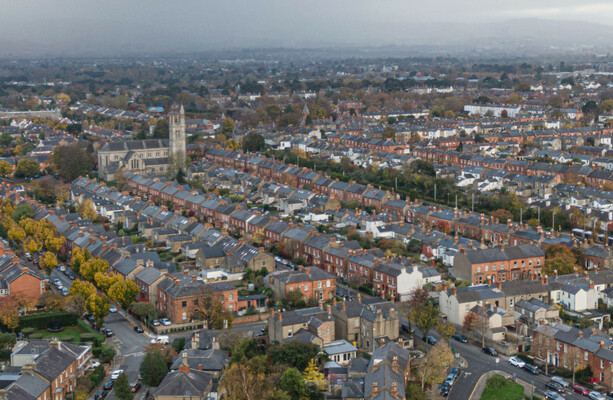Copyright thejournal

We need your help now Support from readers like you keeps The Journal open. You are visiting us because we have something you value. Independent, unbiased news that tells the truth. Advertising revenue goes some way to support our mission, but this year it has not been enough. If you've seen value in our reporting, please contribute what you can, so we can continue to produce accurate and meaningful journalism. For everyone who needs it. One-off amount I already contribute Sign in. It’s quick, free and it’s up to you. An account is an optional way to support the work we do. Find out more. Investigates Investigates Money Diaries The Journal TV Climate Crisis Cost of Living Road Safety Newsletters Temperature Check Inside the Newsroom The Journal Investigates Daft.ie Property Allianz Home The 42 Sport TG4 Entertainment The Explainer A deep dive into one big news story Sport meets news, current affairs, society & pop culture have your say Or create a free account to join the discussion Advertisement More Stories Cityscape view of Dublin.Alamy Stock Photo The Irish government still has no idea how it will fix the rent crisis The country has set targets when it comes to the delivery of housing, but we haven’t defined the result we want. What does success mean? 7.00am, 9 Nov 2025 Share options NOTHING LIKE STARTING an article with an unanswerable question. And they don’t come much more unanswerable than this – how will Ireland fix its rental crisis? Everyone knows the situation is out of control, with spiralling costs and a chronic shortage of supply. But what isn’t acknowledged very frequently is that Ireland has no clear goal it’s working towards to make the situation better. For example – do we want rent prices to fall? If so, by how much? And over what time frame? Or – is the aim just to slow rent increases, so it’s below wage growth? That’s one way to boost affordability. But if that’s the goal, again the question is – how much should rents increase by? And how long will it take to make them more ‘affordable’? These might seem to be unreasonable or difficult questions to pose. But it always goes back to it – what gets measured, gets done. This is true for most areas of the economy. Take the inflation spike in 2022 and 2023. Prices spiked by up to 10% in much of Europe, provoking a cost of living crisis. Central banks and politicians had a clear end result – get inflation back down to 2%. Policies afterwards – most obviously interest rate cuts – helped make this happen. In an Irish context, the country has set targets when it comes to the delivery of housing. But we haven’t defined the result we want. With inflation, it was always clear that officials were working towards getting it to 2%. With rents, what does success mean? Will it be if prices fall by 5%? 10%? Or if they just increase in line with general inflation? Intended result This is crucial. Because, as things stand, Ireland is taking a ‘hit and hope’ approach. Basically, officials are hoping that if they just build enough new homes, then prices will eventually fall. Or stop rising as fast. The desired end result isn’t entirely clear. We already looked at this issue through the lens of house prices. In March, I estimated it would take over a decade for increases in supply to put significant downward pressure on house prices. Earlier this month, the Department of Finance released a report which arrived at a similar conclusion. It’s worth noting here that most of Ireland’s housing targets don’t break down into ‘rent vs buy’. For example, when the Central Bank recently predicted that about 52,000 new homes are needed per year. It didn’t say ‘17,000 of these should be rental housing, while 35,000 should be for buyers’. This is nitty-gritty detail which should be thrashed out by policymakers. But that doesn’t happen. Because they don’t know what end result they’re working towards. Scale of the problem It’s worth quickly going over the scale of Ireland’s rent problem. How long it’s been going on for. And the current approach to dealing with it. Rent prices plunged during the financial crisis. Then, they started rapidly increasing at the onset of the economic recovery, around 2013. By 2014, there were widespread reports of a rent crisis, with prices rapidly rising. That means the issue has been publicly recognised for over a decade. So, what has happened in that time? The problem has gotten much worse. Recent figures from Eurostat, the European statistics agency, show that rents have more than doubled in the period between 2010 and 2025. Ireland recorded the fourth-fastest price increase in the EU, behind just Estonia, Lithuania and Hungary. It is also one of the few EU countries where rents have risen faster than house prices. Advertisement Across the bloc between 2010 and 2025, rents increased by 28.8%. Whereas house prices are up by 60.5%. In that period in Ireland, both have surged. But rents are up slightly more – a 117% increase versus a rise of about 95% for house prices. The problem is worst in Dublin. The capital has become, by most estimates, one of the most expensive EU cities to rent in. Normally in the top three, along with Paris and Luxembourg. Some estimates even have Dublin as the most expensive EU city, bar none. Government response This has all come despite large chunks of the country being designated as RPZs (Rent Pressure Zones) from 2016 onwards. This has been the government’s most obvious, large-scale intervention in the rental market. It’s a measure which many analysts don’t like. There is widespread agreement amongst economists that rent controls tend to lower the supply of new housing. This means that, while prices stay low for renters who have a property already, there aren’t as many new properties available for prospective tenants. This creates a kind of pent-up demand, where prices are kept artificially reduced in existing tenancies. But new renters have fewer options. Because of this, they’re willing to pay more. So the price of newly-rented tenancies rises faster. This is largely what has played out in Ireland – the most recent figures from the RTB (Residential Tenancies Board) found that the average national rent for new tenancies is currently about €1,700 per month, up 5.5% year-on-year. Dublin, of course, is by far the highest, with average new rents of about €2,200 per month. But for existing tenancies, prices are significantly lower – €1,450 nationally, and €1,900 in Dublin. To be fair – this is what was expected when RPZs were introduced. The measure isn’t meant as a catch-all solution to the rent crisis. It’s essentially meant to be a band-aid to protect tenants from the worst of market inflation. And to give time for the government to introduce other measures to tackle the rent crisis. So, what are those other measures introduced alongside RPZs? The main one has been to just try to build more housing. From a rental perspective, the centrepiece of this strategy is cost-rental housing. Introduced in Ireland in 2021, this is a type of housing where the price of rent is only meant to be set at a level to cover building and maintenance – not generate a profit. In Ireland, it involves rents being set at a minimum of a 25% discount to market rents. This is good, as cost rental housing has been shown to cause downward pressure on rent prices. The problem is, Ireland isn’t building nearly enough of them. Just over 2,000 cost rental homes were delivered last year. This year looks like it will be largely similar. It looks like Ireland is on track to meet its aim of providing 18,000 cost rental homes by 2030. The issue is, this is still relatively small-scale. As of 2022, Ireland had 330,000 private rental tenancies. The planned cost rental homes are under 6% of that number. The scale of the demand is illustrated by the fact that, every time a new cost rental development opens, thousands of people apply for what is normally a few dozen homes. What does it all mean? It means that, as things stand, Ireland is a long, long way off resolving its rent crisis. The problem is twofold. One, we haven’t identified what success looks like. There isn’t a clear end goal to work towards, or a timeline. The second, is that government interventions have been too modest. The private market has not been able to provide affordable rental accommodation. Some would say that is due to the RPZs. Landlord groups have certainly argued that removing rent controls will lead to an increase in supply, and an eventual reduction in rent prices. Yet, many studies show that when rent controls are removed, prices for existing and valuations for existing properties tend to rise sharply. It stands to reason that, if RPZs constrict supply, removing them would increase it. And then help put downward pressure on prices. But there aren’t many examples of this panning out in practice. The government should probably work towards removing RPZs in the long-term. But in the short-term, getting rid of them would probably just raise prices further. With the private sector seemingly unable to deliver a steady stream of affordable rental accommodation, the state has somewhat stepped in. But its 18,000 cost rental homes by 2030 simply won’t be enough. Ireland is in the midst of a rent crisis which has lasted for over a decade at this point. To have any chance of finally exiting it, we have to define exactly what we want to achieve. And then act boldly and at scale, to actually realize it. Readers like you are keeping these stories free for everyone... A mix of advertising and supporting contributions helps keep paywalls away from valuable information like this article. Over 5,000 readers like you have already stepped up and support us with a monthly payment or a once-off donation. Support The Journal Paul O'Donoghue View 9 comments Send Tip or Correction Embed this post To embed this post, copy the code below on your site Email “The Irish government still has no idea how it will fix the rent crisis”. Recipient's Email Feedback on “The Irish government still has no idea how it will fix the rent crisis”. Your Feedback Your Email (optional) Report a Comment Please select the reason for reporting this comment. Please give full details of the problem with the comment... This is YOUR comments community. Stay civil, stay constructive, stay on topic. Please familiarise yourself with our comments policy before taking part. Leave a Comment Submit a report Please help us understand how this comment violates our community guidelines. Damaging the good reputation of someone, slander, or libel. Racism or Hate speech An attack on an individual or group based on religion, race, gender, or beliefs. Trolling or Off-topic An attempt to derail the discussion. Inappropriate language Profanity, obscenity, vulgarity, or slurs. Advertising, phishing, scamming, bots, or repetitive posts. Please provide additional information Thank you for the feedback Your feedback has been sent to our team for review. Leave a commentcancel Newly created accounts can only comment using The Journal app. This is to add an extra layer of security to account creation. Download and sign into the app to continue. Access to the comments facility has been disabled for this user View our policy ⚠️ Duplicate comment Post Comment have your say Or create a free account to join the discussion Housing Crisis Paul O'Donoghue rent crisis News in 60 seconds The Morning Lead Companies must begin to search for child sexual abuse imagery on work computers, expert says Niall O'Connor Dublin Pubs Dublin's lost pubs: The old haunts that once dotted the capital city Murder Investigation Thirty years on from Jo Jo Dullard's disappearance, gardaí appeal for information Quiz: How much do you know about breakup albums? Even the NTA is confused about whether students studying in the North can get a student Leap Card Here's What Happened Today: Saturday Peacekeepers Israeli drone strike destroys vehicle short distance from Irish soldiers on patrol in Lebanon Garda investigation launched after woman found dead in Galway home Minute-by-Minute Ireland dominate Japan 41-10 in November Test The Daily Poll How many hours of sleep do you get? The middle road Opinion: Irish drivers may need to start thinking differently about electric vehicles more from us Investigates Money Diaries The Journal TV Journal Media Advertise With Us About FactCheck Our Network FactCheck Knowledge Bank Terms & Legal Notices Terms of Use Cookies & Privacy Advertising Competition more from us TV Listings GAA Fixtures The Video Review Journal Media Advertise With Us Our Network The Journal FactCheck Knowledge Bank Terms & Legal Notices Terms of Use Cookies & Privacy Advertising Competition © 2025 Journal Media Ltd Terms of Use Cookies & Privacy Advertising Competition Switch to Desktop Switch to Mobile The Journal supports the work of the Press Council of Ireland and the Office of the Press Ombudsman, and our staff operate within the Code of Practice. You can obtain a copy of the Code, or contact the Council, at https://www.presscouncil.ie, PH: (01) 6489130, Lo-Call 1800 208 080 or email: mailto:info@presscouncil.ie Report an error, omission or problem: Your Email (optional) Create Email Alert Create an email alert based on the current article Email Address One email every morning As soon as new articles come online



